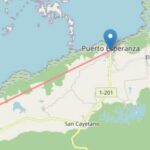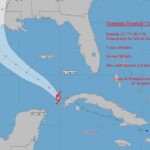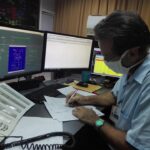Fidel Alejandro Castro Ruz was born on August 13, 1926 in Biran, the former Cuban province of Oriente. His father, Ángel Castro Argiz, the son of poor peasants in Galicia, was a landowner and a sugar cane farmer. His mother, Lina Ruz González, came from a peasant family in the province of Pinar del Río.
He learned to read and write in the rural public school of Biran and continued his primary education in the private Catholic schools of La Salle and Dolores in the city of Santiago de Cuba. He began his bachelor studies at the Colegio de Dolores and concluded them at the Colegio de Belén, of the Compañía de Jesús, in Havana, where he graduated as a Bachelor of Arts in June 1945.
The Jesuits of Bethlehem said: “Fidel Castro was always distinguished in all the subjects related to the letters … He was a true athlete, he has managed to win the admiration and affection of all. He will study Law and we will not doubt that he will fill the book of his life with brilliant pages. Fidel has wood and the artist will not be lacking. “
In September of 1945 he enrolled in the careers of Law and of Social Sciences and Diplomatic Law in the University of Havana. There he was immediately linked to political struggles within university students and held different positions in the University Student Federation. He was a prominent member of various progressive and anti-imperialist student organizations such as the Pro-Independence Committee of Puerto Rico, the September 30 Committee – of which he was a founder – and the Dominican Pro-Democracy Committee, where he held the presidency.
As part of his political activity in those years, he organized and participated in innumerable acts of protest and denunciation against the political and social situation in the country. More than once he was beaten or imprisoned by the repressive forces.
Between July and September of 1947, when he was in the third year of the career, he enrolled in the expeditionary contingent organized to fight against the regime of the Dominican dictator Rafael Leonidas Trujillo. The expedition was trained in Cayo Confites. He was promoted to lieutenant, platoon chief, and later to head of a battalion company. The expedition, which was transferred by boat, was intercepted by a frigate of the Cuban Navy. Fidel jumped into the water with his gun to avoid being captured. He considered it a shame that the expedition had been arrested without a fight.
He came into contact with Marxist ideas when he was already a university student.
A sympathizer of the progressive Cuban Party of the Cuban (Orthodox) Party, he participated actively in the political campaigns of that Party and, in particular, its main leader, Eduardo R. Chibas. Within his political organization he worked to cultivate among the young militancy the most radical and combative positions. After the death of Chibás, he redoubled his efforts to unmask the corruption of the government of Carlos Prío.
After his participation in the expedition against Trujillo, he traveled to Venezuela, Panama and Colombia in 1948 as a student leader, with the objective of organizing a Latin American Congress of Students, to be held in that country. He was in Bogota when the popular revolt provoked by the assassination of Colombian leader Jorge Eliécer Gaitán in April of that year. He resolutely joined that struggle. He survived by pure chance.
In March 1949 he led a protest in front of the United States diplomatic mission in Havana to express popular indignation at the failure of the US Marines to mark the Cuban National Hero’s monument, José Martí.
Fidel graduated as a Doctor of Civil Law and a Diplomat in Diplomatic Law in 1950. From his firm, he dedicated himself mainly to the defense of humble people and sectors.
When Fulgencio Batista’s coup d’etat occurred, on March 10, 1952, he was among the first to denounce the reactionary and illegitimate character of the de facto regime and call for his overthrow.
He organized and trained a large contingent of more than a thousand young workers, employees and students, who came primarily from the Orthodox ranks. With 160 of them, on July 26, 1953, he commanded the assault on the Moncada barracks in Santiago de Cuba and the Bayamo barracks, in an action designed to detonate the armed struggle against the Batista regime.
When the surprise factor failed, they could not reach the target. He was taken prisoner by the repressive forces of tyranny a few days after the military setback and was kept incommunicado for 76 days. He was subsequently tried and sentenced to 15 years in prison. In a reserved and guarded environment, he assumed his self-defense before the court that tried him, and pronounced the allegation known as History Will Absolve me, which outlined the program of the future Revolution in Cuba.
“No weapon, no force is able to defeat a people who decide to fight for their rights. Past and present historical examples are uncountable. The case of Bolivia is very recent, where the miners, with dynamite cartridges, defeated and crushed the regiments of the regular army, “he said on that occasion.
From prison he continued his work of denouncing the oppressive regime, while he matured his revolutionary plans and deepened the theoretical and ideological preparation of his companions.
As a result of strong pressure and popular campaigns, he was released in May 1955. In the following weeks he undertook intense work of agitation and denunciation, and founded the 26th of July Movement to continue the revolutionary struggle.
In July 1955, due to the impossibility of continuing the anti-Batista struggle by legal means, Fidel left for Mexico to organize the armed insurrection from exile. In precarious economic conditions and subjected to the close monitoring and persecution of the Batista agents, he undertook vigorous organizational and preparatory work, while an intense campaign of dissemination of the ideas and purposes of the insurrectional movement continued. He traveled to the United States, where he created with his exiled compatriots “patriotic clubs” in order to get political and economic support for the revolutionary struggle. He was in Philadelphia, New York, Tampa, Union City, Bridgeport and Miami.
Under the motto: “In 1956 we will be free or we will be martyrs”, Fidel, Raúl, Juan Manuel Márquez, Ernesto Che Guevara, Camilo Cienfuegos and other outstanding revolutionaries were training with long walks through the streets of Mexico City, self-defense, guerrilla tactics, and firing practices.
On June 20, 1956, the head of the 26th of July Movement, Che and other fighters were arrested, the “camp houses” were discovered and a significant part of the weapons were seized.
After being released from the establishments of the Mexican police, the revolutionary conspiracy was accelerated. They bought the Granma yacht, in which they sailed for Cuba in the early hours of November 25, 1956, from the Tuxpan River, with 82 fighters on board, whose average age was 27 years.
After 7 days of navigation, they landed on December 2 in Las Coloradas, the south-western coast of the former province of Oriente. Batistian forces located the landing and harassed the expeditionaries. On December 5, the army of the tyranny surprised Fidel and his fighters in Alegria de Pio. The revolutionaries were decimated, several were arrested during the persecution and many were killed.
With the valuable collaboration of the peasants, Fidel meets Raúl in Cinco Palmas and regroups the revolutionary force. He then went to the Sierra Maestra to continue the revolutionary struggle.
On January 17, 1957, he led the first armed action against Batista’s army at the La Plata barracks and won his first victory. The Rebel Army began to grow and strengthen.
As Commander-in-Chief, he led the military action and the revolutionary struggle of the rebel forces and the 26th of July Movement during the 25-month war. He had the direct command of Column One “Jose Marti” and personally participated in almost all the operations, combats and more important battles that took effect during the war in the territory of the First Rebel Front.
After the overwhelming defeat of the elite troops of the tyranny, these, through their main leaders, decided to recognize the rebel victory in the theater of operations of Oriente province, on December 28. At dawn on January 1st, 1959, Fidel faced, with a general revolutionary strike, supported by all the workers, the coup d’état in the capital of the Republic, promoted by the US government. He entered that same day in Santiago de Cuba and arrived in Havana on January 8.
At the conclusion of the insurrectional struggle, he maintained his functions as Commander-in-Chief. On February 13, 1959, he was appointed Prime Minister of the Revolutionary Government.
He led and participated in all actions undertaken in defense of the country and the Revolution in cases of military aggression from abroad or activities of counterrevolutionary gangs within the country, especially the defeat of the invasion organized by the Central Intelligence Agency of the United States, carried out by Playa Girón in April of 1961.
He led the Cuban people in the days of the dramatic October Crisis of 1962.
In the name of revolutionary power, he proclaimed on April 16, 1961, the socialist character of the Cuban Revolution.
He held the post of General Secretary of the Integrated Revolutionary Organizations, and later the Secretary General of the United Party of the Socialist Revolution of Cuba. From the Constitution of the Central Committee of the Communist Party of Cuba in October 1965, his position was First Secretary and Member of the Political Bureau, in which he was ratified by the five Party Congresses held since then.
He was elected Deputy to the National Assembly of People’s Power, representing the municipality of Santiago de Cuba, in successive sessions since the creation of that in 1976, and from then until 2008 he held the positions of President of the State Council and President of the Council of Ministers.
He presided over Cuban official missions in more than 50 countries.
He received more than a hundred high foreign and Cuban decorations, as well as numerous honorary academic distinctions of higher education institutions in Cuba, Latin America and Europe.
He strategically led the participation of hundreds of thousands of Cuban combatants in international missions in Algeria, Syria, Angola, Ethiopia and other countries, and promoted and organized the contribution of tens of thousands of Cuban doctors, teachers and technicians who have rendered services in more Of 40 countries of the Third World, as well as the realization of studies in Cuba by tens of thousands of students of those countries. More recently, he promoted comprehensive programs of Cuban assistance and collaboration in health in many countries of Africa, Latin America and the Caribbean and the creation in Cuba of international schools of Medical Sciences, Sport, and Physical Education and other disciplines for Students of the Third World.
Fidel promoted on a global scale the Third World’s battle against the current international economic order, in particular against external debt, the waste of resources as a result of military expenditures and neoliberal globalization, as well as efforts for the unity and integration of Latin America and the Caribbean
He spearheaded the determined action of the Cuban people to confront the effects of the economic blockade imposed on Cuba by the United States for over forty years and the economic consequences of the collapse of the European socialist community and has promoted the tenacious effort of the Cubans to overcome the serious difficulties resulting from these factors, their resistance during the so-called Special Period and the resumption of economic growth and development of the country.
Throughout the years of the Revolution, he promoted and directed the struggle of the Cuban people for the consolidation of the revolutionary process, its advance towards socialism, the unity of the revolutionary forces and of the whole people, the economic and social transformations of the country , the development of education, health, sport, culture and science, defense, confrontation of external aggressions, conducting an active foreign policy of principles, actions of solidarity with peoples struggling for Independence and progress, and the deepening of the revolutionary, internationalist and communist consciousness of the people.
Having resigned from official positions for health problems, he dedicated to write. By its moral authority, he kept his influences in important and strategic decisions of the Revolution.
He died on November 25th, 2016.




